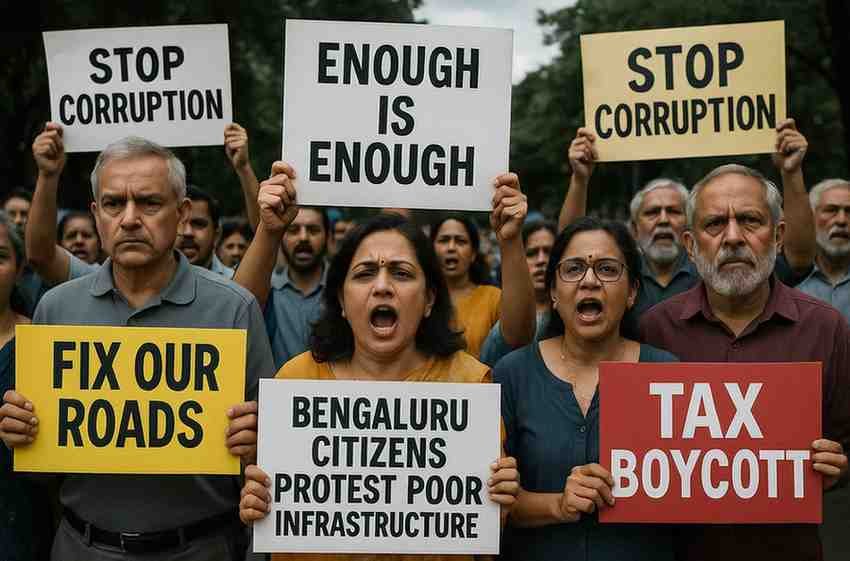Bengaluru Residents Unite Against Failing Infrastructure
Mounting anger over the deteriorating state of Bengaluru’s civic infrastructure has sparked a citizens’ movement threatening to stop paying property tax unless the government addresses worsening road and drainage conditions. The protest comes amid renewed public debate over the city’s collapsing infrastructure, triggered by Biocon chief Kiran Mazumdar-Shaw’s remarks about Bengaluru’s poor condition.
The Individual Tax Payers Forum (ITPF), representing several residents and taxpayers of the city, has written to Chief Minister Siddaramaiah demanding accountability from civic authorities. The forum’s letter accused the Bruhat Bengaluru Mahanagara Palike (BBMP) and Greater Bengaluru Authority (GBA) of “unscientific and poorly coordinated” civic projects, especially in the Varthur-Balagere-Panathur area.
Citizen Outrage Over “Unscientific” Road Works
According to the letter accessed by NDTV, citizens alleged that the municipal bodies had taken up road asphalting and white-topping works without completing the city’s crucial stormwater drainage network. They warned that such “half-measures” would only lead to premature road damage, causing further financial waste.
“The citizens and taxpayers are suffering immensely along with our families and children because of bad civic planning,” the letter said, adding that flooding incidents in parts of the city had exposed the lack of foresight in infrastructure planning. The forum urged the government to direct authorities to halt property tax collection until residents are provided with “good public infrastructure.”
The signatories further highlighted the changing global perception of Bengaluru, lamenting that the city—once hailed as India’s technology capital—is now being mocked as the “Pothole City” or “Garbage City.” They called for immediate intervention to restore Bengaluru’s reputation as a world-class urban hub.
Kiran Mazumdar-Shaw Reignites the Debate
The infrastructure debate reignited when Kiran Mazumdar-Shaw shared a foreign executive’s critical observations on Bengaluru’s deteriorating civic conditions, including damaged roads and unchecked garbage accumulation. Shaw posted on X (formerly Twitter) that the city’s “dire situation” was a result of years of administrative neglect and urged the current government to take decisive action.
“This government has the opportunity to change this and act fast to fix decades of deteriorating infrastructure and garbage management,” she stated, emphasizing that proactive leadership could still salvage Bengaluru’s global image.
Government’s Response and Action Plan
Responding to the criticism, Karnataka Deputy Chief Minister and Bengaluru Development Minister DK Shivakumar asserted that infrastructure works are progressing at pace. In a post written in Kannada, he stated, “Giving priority to smooth traffic in Bengaluru city, the work of asphalting roads at various places in the city and filling potholes is progressing swiftly.”
Shivakumar claimed that over 13,000 potholes across Bengaluru have been filled so far. He added that his department is working on a ₹1,100-crore plan to develop 550 kilometres of arterial roads across the city. The minister stressed that he aims to find a “permanent solution” to the city’s recurring road problems and has instructed officials to accelerate the repair work.
Meanwhile, other senior ministers, including Priyank Kharge and M B Patil, acknowledged the infrastructure crisis and called for collective efforts from all stakeholders. They admitted that resolving Bengaluru’s deep-rooted urban challenges would take time but assured citizens that steps were being taken.
Growing Pressure for Accountability
Despite the assurances, public frustration continues to build. Social media platforms are filled with images of cratered roads, flooded junctions, and traffic gridlocks. Resident associations have been sharing open letters demanding better coordination between various civic agencies to ensure sustainable urban planning.
Urban experts have also weighed in, noting that Bengaluru’s infrastructure issues stem from unplanned urban sprawl, encroached stormwater drains, and overlapping administrative jurisdictions. They argue that piecemeal solutions such as temporary pothole filling will not suffice without structural reforms in civic management.
A City at a Crossroads
As India’s tech hub and home to thousands of startups and multinational offices, Bengaluru’s deteriorating public infrastructure has broader economic implications. Delays in commute, waterlogging, and inconsistent waste management have already begun to affect the city’s productivity and livability indices.
While the state government’s promises of swift action offer a glimmer of hope, residents remain skeptical. For now, the tax protest movement symbolizes a growing demand for accountability and efficiency—one that could push Bengaluru’s leadership to finally deliver the infrastructure India’s “Silicon City” deserves.








